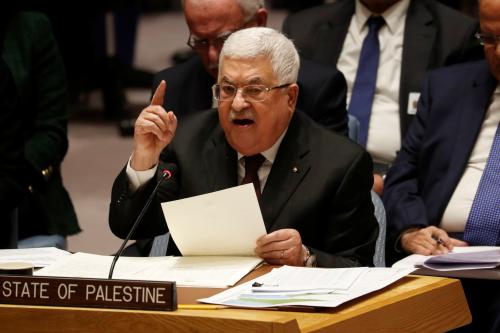Content from the Brookings Doha Center is now archived. In September 2021, after 14 years of impactful partnership, Brookings and the Brookings Doha Center announced that they were ending their affiliation. The Brookings Doha Center is now the Middle East Council on Global Affairs, a separate public policy institution based in Qatar.
After more than a quarter-century, the Oslo Accords came to an end last week. From his presidential compound in Ramallah, Mahmoud Abbas — the chairman of the Palestine Liberation Organization (PLO) and president of the Palestinian Authority (PA) — delivered a speech in which he said Palestinians have become “absolved of all agreements and understandings with Israel and the United States,” including on security coordination.
The bombshell statement came a few days after Israel’s new unity government was sworn into office and made plain its intention to push forward with plans to begin annexing sizable portions of the West Bank as early as July 1. If Israel follows through, a Palestinian state in the West Bank will be rendered impossible, and the Oslo Accords that were signed in order to facilitate Palestinian self-determination and self-governance in what they believed would be that state will have lost whatever meaning or promise they still retained.
Nonetheless, Abbas’ announcement was far from a concrete and detailed plan of action that most would have expected in this situation. This likely signals a lingering reticence, a stunning lack of planning, and confusion over how to proceed after what will likely prove to be a decisive and irreversible step.
What Abbas did and didn’t say
The speech left numerous questions unanswered, including: Does being “absolved of” the Oslo Accords signify that the PA will stop coordinating with Israel, or disband altogether? Does absolution from understandings and agreements mean that the PLO’s recognition of Israel, made in Oslo’s Declaration of Principles, is no longer valid?
More practically, how will the West Bank be governed going forward, given the complex system of administrative and security jurisdictions established by Oslo? Who will be in charge of policing, education, healthcare, and other services for the Palestinian population, which Israel transferred to the PA through a detailed negotiation process in 1995? Can that process be reversed simply by declaration?
And crucially, how do the millions of Palestinians in the West Bank carry on day-to-day life and economic activity, which have been conducted in accordance with those agreements and structures for a quarter-century?
No doubt the decision to exit the Oslo Accords is a long time coming. Israel has regularly violated every aspect of the agreements for years. And for years, Abbas and others have threatened to leave them — a threat that has never been acted upon. Within the PLO and among the public, ending cooperation with Israel, especially on security, is very popular. Palestinians resent their government’s tight security cooperation with Israel, in particular, while it continues its military occupation and human rights abuses.
Moreover, Palestinian political institutions are extremely convoluted as a result of the Oslo process. Today, the Palestinians are governed or represented, however poorly, by the PLO, the PA, and the State of Palestine, all of which have unclear and overlapping roles and are headed by the same man, Mahmoud Abbas.
While Abbas’ speech was short on details, it did offer a few more points that shed additional light on what the leadership may be thinking.
First, the Palestinian leader called on Israel to resume its full obligations under international law as an occupying power. Again, how and when this happens in practice was left unclear, but we can glean that Abbas expects Israel to take over some portion of its responsibilities.
Second, Abbas did not mention the Palestinian Authority in his speech. Instead he referred to the State of Palestine under Israeli occupation. What this insinuates is that by ending the agreements but not explicitly disbanding the PA, its leadership has reconstituted the PA as the State of Palestine — in line with its status within the United Nations system — that is being occupied by Israel.
This is a key point that needs to be explored. Unfortunately, it was only suggested in Abbas’ speech, leaving many ambiguities. It should be articulated in depth for all the relevant parties, including the Palestinian people, who still live their lives and run their affairs and businesses through the system and structures Oslo created — and who are upended by this transformation.
How we got here
The presumed logic of this approach stems from Palestine’s Declaration of Independence as a state in 1988, which has been recognized by 138 countries around the world. Yet at the time statehood was in name only.
Five years later, the PLO entered into the Oslo process, and it agreed to reach statehood through negotiations with Israel — even though Israel was simultaneously undermining the prospects for a Palestinian state on the ground through expansionist settlement policies. In the Benjamin Netanyahu era in particular, negotiations felt to Palestinians more like an impediment to statehood than a facilitator of it.
By 2011, key observers to the conflict — including the United Nations, European Union, World Bank, and others — considered the Palestinian state-building project ready, but negotiations were still making no headway.
As a result, Palestinians sought to bypass the broken peace process by appealing for statehood recognition directly to the United Nations in late 2011, while still remaining committed to Oslo at home. The first major achievement in this process came in November 2012, when Palestine was granted non-member observer status by the U.N. General Assembly, thereby opening the door for recognition in a number of other forums in the following years.
Cause for skepticism
This latest act by Abbas to supplant the PA with the State of Palestine should be viewed in line with these other measures seeking statehood as a counter to Israeli actions on the ground. For the risk-averse Abbas, it may be especially appealing because it does not constitute a revolutionary change for the Palestinian national movement. The leadership avoids having to fundamentally restructure its institutions, to revive and reform the PLO, to rethink its ultimate political agenda beyond the traditional two-state paradigm, to empower the local Palestinian population and diaspora, or to reconcile relations with Hamas.
Consequently, it is likely that critics within the Palestinian community will malign the step as a means of keeping current structures intact in order to preserve the power and privilege of its direct stakeholders, without actually confronting the gravity of the situation posed by annexation.
Indeed, there are many reasons to doubt the sincerity of the Palestinian leadership or its capacity to execute such a strategy. For two decades, it would have been possible and sensible for the PLO leadership to continue to pursue peace while preparing for its possible failure. Years of valuable preparation time have been squandered by not developing contingency plans for this very moment, with annexation openly on the table. Moreover, the institutions of state that this strategy seeks to empower have been undermined by years of neglect, corruption, a lack of elections, and the dissolution of the elected parliament in 2018 — all while power has been centralized in the hands of the few.
That does not mean that Abbas’ step away from Oslo cannot be followed up by others in a cohesive strategy aimed at strengthening the position of Palestinian governance on the ground. Palestinian leadership should focus on restoring legitimacy to its officials and institutions through elections and the decentralization of power, convincing Palestinians that the pursuit of statehood is still a viable way forward, and marshaling resources and launching a forward-looking campaign to achieve that end goal. Such a strategy must also rally Palestinians and the international community in defense of a viable alternative to President Trump’s “Deal of the Century,” which in effect is being used by Netanyahu to replace Oslo.
But given how weak and fragmented the Palestinian polity is, disconnected from its people and sorely lacking in popular legitimacy, it is difficult to see such a strategy coming together at the hands of this leadership. And at this late hour, with annexation at the doorstep, it must be seriously questioned whether this state-seeking agenda is still applicable or whether a new paradigm will be needed in the post-annexation future.







Commentary
Years of dereliction has left the PLO facing annexation without a plan
May 26, 2020